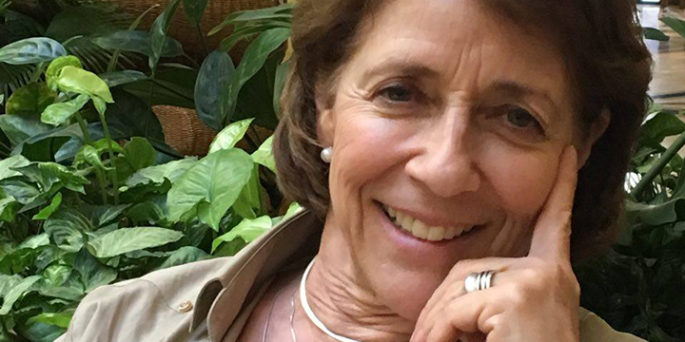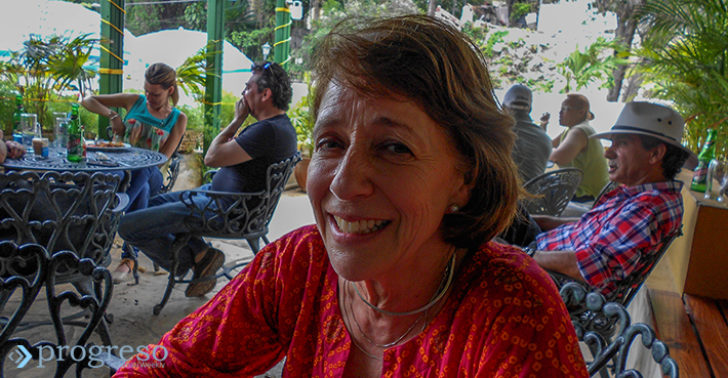
Mariana Gastón: ‘It is good that Cubans of all persuasions are interested in bettering relations’
Mariana Gaston is a retired New York city teacher and a relentless activist for better public schools. For decades she has advocated and worked to change U.S. policy towards Cuba. She is a founding member of the Antonio Maceo Brigade and the Committee of Cuban Americans for the Normalization of Relations with Cuba. She spends part of her time these days working as a volunteer for the Bernie Sanders campaign. Mariana was kind enough to grant us this interview.
You recently helped the Sanders campaign in the Massachusetts primary. Why?
Yes, I worked as a volunteer for Bernie Sanders’ presidential campaign in Massachusetts and I’m right now helping the campaign in my hometown of New York city. I believe that Bernie Sanders is providing a perspective to the people of the U.S. that explains the reality of why things are the way they are for so many of us ordinary people. He also points to what can be possible in the richest economy in the world today. I believe the government is supposed to help all the people not just the very rich. Health care is a right. Economic inequality is wrong.
My sons and my nephews and nieces are swamped in student loans. It is hard to find a decent paying job even if you have a PHD. There is huge economic inequality in a very rich country. Bernie is pointing out how the social, political, economic system is working and he is unmasking what is the reality of how things really work in the country. He is showing how the billionaires and the pharmaceuticals, the insurance companies, the fossil fuel industry and all the people that are getting rich have rigged the electoral system so that only the politicians that get elected are the ones that continue to make the rich richer and the ordinary working people and the poor are in worst economic conditions. Bernie is a teacher and the people are learning quickly, especially the next generation of Americans.
Can you tell me a little bit of what you did and what it was like?
My husband and I mainly canvassed voters in diverse neighborhoods in Boston: ringing doorbells and talking to voters. We are doing the same thing in NYC right now. I’m working in the neighborhood of Sunset Park in Brooklyn, where I used to work and where there is a significant number of Latino voters.
I speak to people and let them know what Bernie Sanders’ positions are on immigration, the economy, health care, public education, racism and the criminal justice system. Once people have this information they seem very interested in voting for him. I’m reaching out to registered voters to get them to vote in the primary on April 19. Bernie was born and grew up in Brooklyn and has a clear and important message for people of color and all working people in the city.
You are a Cuban-American. The general perception is that Cuban-Americans are conservative, on the right of the political spectrum. So it seems odd that you would be supporting a candidate that is so much on the left. Can you explain to me how that came about? And are there others like you?
I’m a Cuban-born citizen of the United States who immigrated when I was a young person with my parents and siblings. I have gained a perspective of economic and social justice by being involved in the anti-Vietnam war demonstrations and in many marches for equal rights and social and economic justice when Martin Luther King was still alive and for many years since. My college education and my experience as a classroom teacher and later as an administrator in public schools here in NYC have been important in teaching me how the U.S. economy works and how our social, racial and economic system works.
As a Latina, a mother, an immigrant and a dual language teacher I have been deeply involved in fighting for fair funding for public schools. I was involved in the struggle to start a new public school in Brooklyn that had a real mixed population by race and socioeconomic status and that provided a child-centered curriculum and gave students the opportunity to develop their critical thinking skills, to enable hem to become full participants in a democratic system of government. So my experience as an activist and as a professional in the U.S. have enabled me to understand how inequities play out in the society. There are many Cuban Americans and other Latin American immigrants in NYC and in the whole country who want economic justice and a full fair chance to live a secure and healthy life for themselves and their children.

There are big changes happening in relations between Cuba and the U.S., what is your opinion of them?
I was surprised and overjoyed like so many other people on Dec. 17, 2014, when Presidents Obama and Raul, announced the beginning of the negotiations between Cuba and the U.S. I was very happy when Obama visited Havana a few weeks ago. Many of us in the Cuban community here in the U.S., along with ordinary Americans, have been pressuring many U.S. administrations over many years to end the economic blockade of Cuba and enter into diplomatic relations. I have participated as a Cuban living the U.S. in many meetings over the years between representatives of the Cuban government and members of the Cuban community in the Dialogue. These periodic conversations which started in 1978 during Jimmy Carter’s administration have encouraged and involved many of us in asking the Cuban government to open its doors to those of us that live outside. We have been asking for family reunification, release of political prisoners, rights to return to live in our country. It has taken a long time for this to happen.
Cubans living the U.S. can begin now to normalize their relationship with their country of origin just like any other immigrant has been able to do in a country of immigrants. It is high time for the United States government to stop punishing the Cuban people and to stop trying to decide how the Cuban people deal with their own government. Many of us have been lobbying politicians in Washington, D.C. during the Obama years to normalize relations with Cuba. We are elated by the possibilities for the future. I believe that Barak Obama has come to his senses during this last year of his administration and took the opportunity to respond not only to the Cuban community, but to the business community, and to the desire of the American people to get to know and love Cuba the way so many of us do.
You are from the left and you have long been active in trying to change U.S. policy towards Cuba. That is now happening, but the Cuban-Americans who seem to be most prominent in these developments are not the left, but moderates and even hard-right conservatives. They are the ones that the President meets with before going to Cuba, and the ones that are going to Cuba with him on his trip, and the ones who seem most active in seeking to do business with Cuba. How do you feel about that?
It is good that Cubans of all persuasions are interested in bettering relations between the two countries. It is up to the Cuban people and the Cuban government to figure out how they manage that relationship. I would like to see a way that socialist democracy grows and is enhanced in Cuba. This is a moment of great challenge for the Cuban government and for the process of opening the economy not only to foreign investors but also to greater participation of ordinary Cubans. At the same time, the Cuban government needs to move toward a more participatory society while it continues to play a role in developing an economy and a political system that is fair, just and open to all the people of Cuba and not just for a few.

